Collaboratory update April 2023 | Ethiopia
05 May 2023


Workshop participants had hands-on training on the portable tools of the Hub’s suitcase laboratory
The Hub is committed to building capacity and establishing global networks to improve water quality monitoring and wastewater treatment worldwide. This spring, Hub researchers from Newcastle University, NUMed, and IWMI collaborated with colleagues from Ardhi University and the Addis Ababa Water and Sewerage Authority (AAWSA) to deliver a Pan-African workshop on molecular microbiology. 37 water researchers and professionals from 10 African countries attended the workshop, delivered in the newly-built AAWSA wastewater laboratory at the Kaliti sewage treatment plant, in Addis Ababa. Read more about the workshop here.
Active stakeholder engagement is central to the Hub’s work and crucial in enabling equitable and sustainable change. Our Ethiopia Collaboratory works with a diverse range of stakeholders, including government officials, community members, industry representatives, city planners, water resource experts, environmentalists, consultants, and researchers working in water and spatial planning. The team recently held collaborative events on several topics, including: water supply and the Addis Ababa Adaptation Network (AAAN); assessing the water sensitivity of Addis Ababa; and water allocation, use, and governance in the Central Rift Valley (CRV).
A key focus area for Earth Day 2023 was climate education and literacy: making environmental and climate education accessible to all. Our Ethiopian team is engaging school pupils in climate change and water security research. Colleagues at IWMI have established extracurricular water clubs to raise awareness of water (in)security and support local communities in finding practical solutions to water challenges. Colleagues at WLRC have established extracurricular citizen science clubs and are using the miniSASS tool to increase young people and school pupils’ understanding of the importance of healthy river ecosystems. Read more about the environmental clubs here.
One of the Hub’s key research strands is exploring the multiple values that water holds across society and how we can best incorporate these into a systems approach to enable sustainable development. As in other peri-urban and urban communities across Sub-Saharan Africa, water represents numerous values for the people living in the Akaki catchment, including ecological, economic, socio-cultural and spiritual. Colleagues at IWMI have been investigating these values in relation to the impact of human activities on the river. Read more about their work here.
Water risks and the intersection and exacerbation of risks is another of the Hub’s cross-cutting themes. Our Leeds team has developed the MUISKA framework, a tool that assesses and compares multiple water-related risks at a basin level, enabling a nuanced risk analysis of interlinked dependencies. They recently hosted a workshop for our Ethiopia colleagues, exploring the application of MUISKA within the Akaki catchment to reveal causes and effects of water-related hazards. As part of the activity, researchers visited key sites within the Akaki catchment, including the Legedadi reservoir (one of three water supply reservoirs in the basin), and the Akaki floodplain.
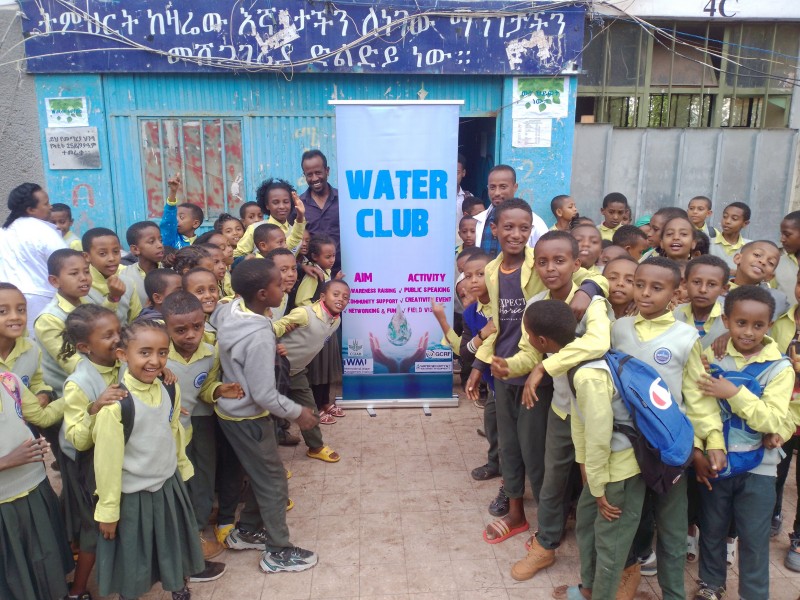
Eager water club members
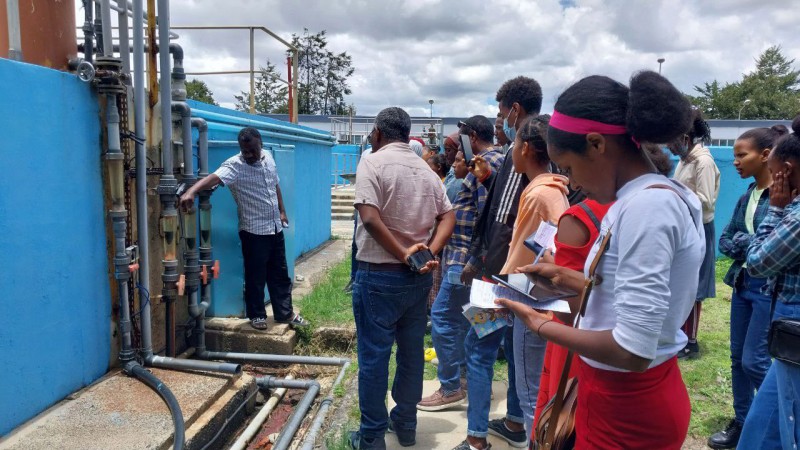
Water club members have been able to learn about water treatment directly from AAWSA staff

Participants at the values workshop

The workshop explored multiple and sometimes competing values of water
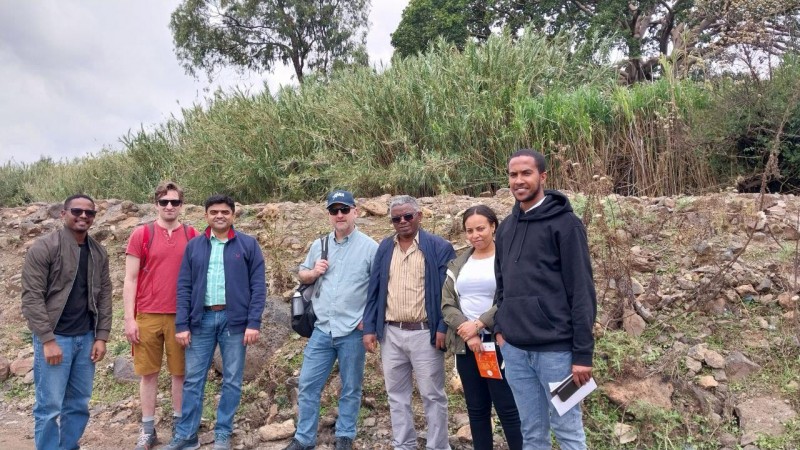
Hub researchers visited key sites related to flood risk research
The Leeds team are also working with the Ethiopia Collaboratory on flooding and flood management. Earlier this year, 19 attendees from Addis Ababa University (AAU), the Ethiopian Meteorology Agency, Addis Ababa Fire and Emergency Service, the Ethiopian Construction Design and Supervision Works Corporation (ECDSWC), and AAWSA came together to share their experiences managing flood risk. Research dissemination included: managing urban flood risk, mapping flood exposure and hazards using global datasets, dealing with extreme uncertainty in decision-making, and understanding local context for global flood mapping. Hub researchers also led training on flood modelling, providing local stakeholders with information, tools, and techniques for engaging communities and understanding their concerns. The event provided an opportunity not just for knowledge exchange but also to expand the AAAN, formed by Hub members, to include more flood experts.
The Ethiopian team has continued field work on a variety of research activities. Researchers are exploring the impact of human interventions on hydrological conditions within catchments, visiting the Ribb, Gumera, Megech, Gilgel Abay, and Ayu rivers to gain understanding of anthropogenic influences on river flow. Investigations so far have revealed that not all diversion works are attributable to human water abstraction: some reservoirs do not have any connection with human use or abstraction; design failures due to a lack of data have led to dysfunctional diversion-works; additional means of increasing water availability (e.g. rainwater harvesting) should be planned in areas where there is only one growing season; and the dependable flow of rivers should be taken into account prior to the implementation of development projects. An example from the Ayu River is that once agricultural development began in the area, many irrigation projects were implemented, leading to severe conflicts in water use between local communities and industry. These findings demonstrate the importance of accessible data for informed decision-making and development planning.
As part of data collection on agricultural water utilisation issues, risks, and management strategies in the Abbay basin, colleagues conducted interviews with over 20 experts in natural resources management, crop management, and irrigation. Focus group discussions were also held with local farmers, exploring green water management risks like drought, flood, soil erosion, frost action, waterlogging, snow, pests, and diseases. A number of soil and water conservation strategies were identified, including physical soil and water conservation structures, biological measures, agroforestry, inter-cropping, and irrigation techniques.

Field work on the impact of human interventions on hydrological conditions
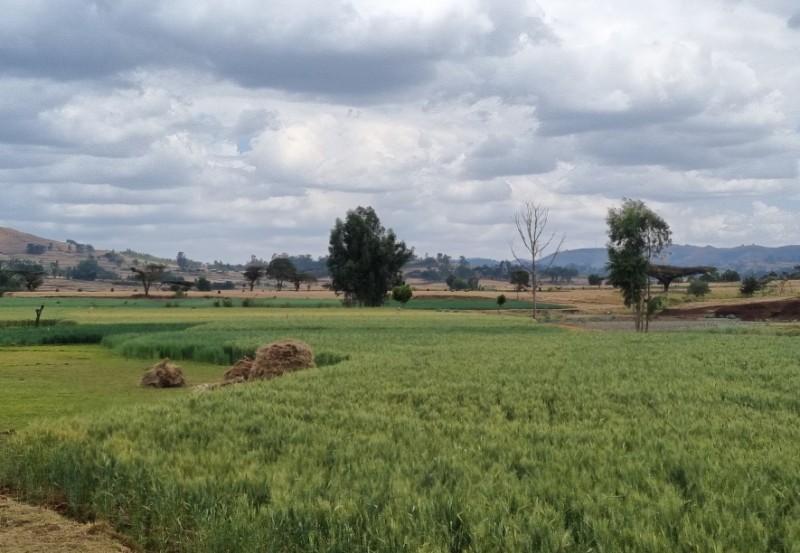
Field work on agricultural water use
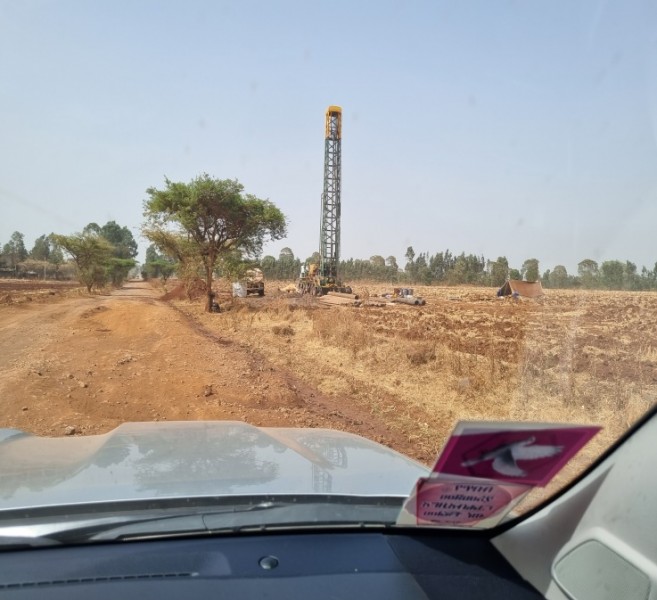
Field work on the impact of human interventions
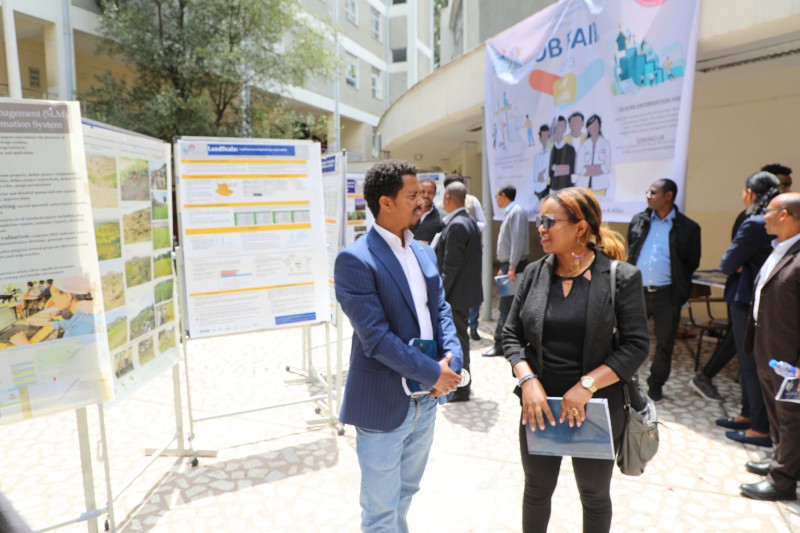
Dr Bitew Kassaw and Dr Adey Nigatu at the research and fairs week
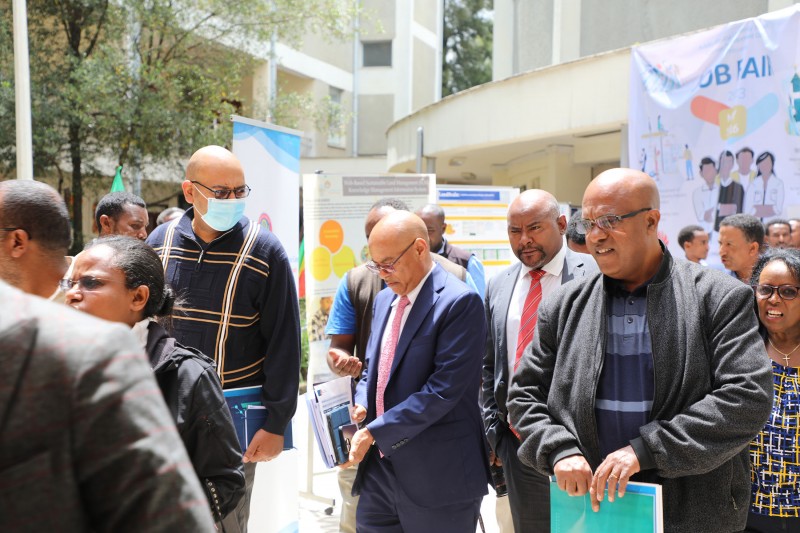
H.E. Dr Belete Molla (MoST), and Professor Tasew W/hanna, AAU President
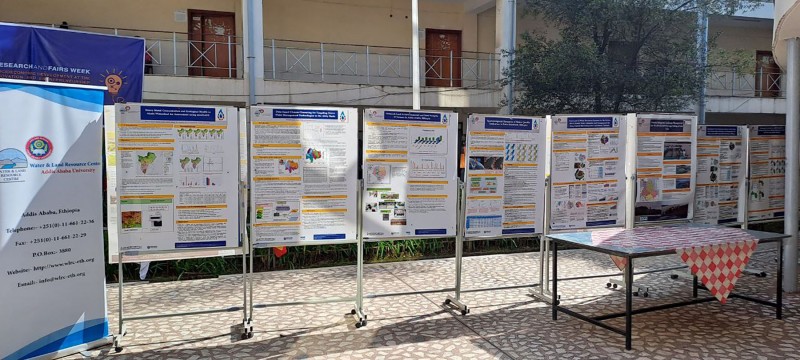
Posters submitted by our Ethiopia team
Several members of the team took part in the annual Addis Ababa University Research and Fairs Week. The event, “Fostering Socioeconomic Development at the Core of Innovation and Entrepreneurship”, provided an opportunity for Hub researchers to share their research activities and achievements to a variety of guests, including: H.E. Ahmed Shidie, Ministry of Finance; H.E. Fitsum Assefa (PhD), Ministry of Planning and Development; and H.E. Belete Molla (PhD), Ministry of Science and Innovation. The team presented 10 posters comprising the activities, accomplishments, and research results of the Hub’s work including (but not limited to); power dynamics in governance, health impacts of using wastewater for irrigation, and assessment and evaluation for robust water allocation and management.
Dr Adey Nigatu participated in the 2023 Regional Climate Smart Agriculture Policy Dialogue, focused this year on transitioning to climate-resilient farming systems in Sub-Saharan Africa. Adey also participated in a Virtual Irrigation Academy (VIA) training workshop on innovative, effective, and easy to use climate smart technologies that address the challenge of efficient and sustainable use of water resources. Dr Ermias Teferi attended the ARUA Water CoE RESBEN Research Webinar 2023, presenting his work, “Implications of Watershed Management Practices on Water Availability Using Hydrus 1D Model in Aba Gerima Watershed, Upper Blue Nile basin, Ethiopia”.
Finally, congratulations to Wegayehu Asfaw for securing a research fellowship with the German Research Centre for Geosciences. During his fellowship, Wegayehu will investigate climate change impacts on flood susceptibility in the Akaki catchment, focusing on Addis Ababa. Congratulations to Dr Mekonnen Adnew on securing a grant for the project, “Bridging critical gaps in relative humidity data to enhance climate science and services in Ethiopia: The case of Awash River Basin”.



